New York, February 10, 2011—Incumbent Ivorian President Laurent Gbagbo has moved to silence critical media under the guise of media regulation, the Committee to Protect Journalists said today, following a week in which Gbagbo’s administration tightened control over the official print media regulatory agency and ordered United Nations-sponsored radio network ONUCI FM off the air.
On Wednesday, the Gbagbo-controlled National Council on Audiovisual Communication (CNCA) issued a statement revoking ONUCI FM‘s broadcasting license. CNCA President Franc Andersson Kouassi told CPJ today that Ivory Coast was reclaiming the 13 frequencies it granted the news station in line with a December 18 statement by Gbagbo calling for the U.N. mission to immediately leave the country.
In a press conference today in the economic capital, Abidjan, ONUCI spokesman Hamadoun Touré told journalists the mission had not been officially notified about the decision, according to a transcript obtained by CPJ. ONUCI has repeatedly rejected accusations of bias from the Gbagbo administration, according to news reports. The station remained on the air late today, local journalists said.
Also as part of an ongoing struggle for control of the media, Gbagbo issued a decree on February 4 that sacked the head of Ivory Coast’s official print media regulator, the National Press Council (CNP), and dismissed its board, according to news reports.
“Under cover of media regulation, the Gbagbo administration is moving to silence critical and independent media outlets,” said CPJ Africa Advocacy Coordinator Mohamed Keita. “We call on Laurent Gbagbo to restore the broadcast license of ONUCI FM immediately.”
Under Ivorian laws, the chair of the press council, who is named by presidential decree for a three-year term, can only be let go for misconduct, according to CPJ research. However, the ousted council chairman, veteran journalist Eugène Dié Kacou, told CPJ he was fired without explanation before the April 2012 expiration of his mandate. Kacou said the Gbagbo government had pressed him since December 2010 to close down pro-opposition newspapers supporting Gbagbo’s rival, Alassane Ouattara. Local journalists told CPJ that they perceive the council’s new board, appointed by a February 7 decree, to be allies of Gbagbo.
The United Nations and international community have recognized Ouattara as the president-elect since disputed November 2010 runoff elections.
